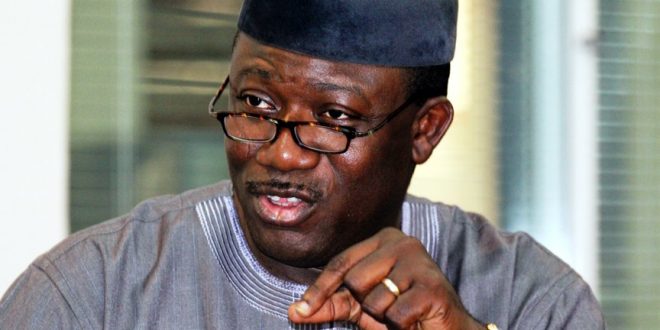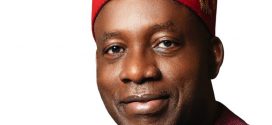By Femi Odere
In a society not known for applying rigour to the critical issues of its time, and whose attention span whenever it does these issues that are capable of fundamentally reshaping its wellbeing and sustainability in both the medium and long terms are only skin-deep—–or woolly at best—–but spends much time and energy on the mundane and the ridiculous (which someone ingeniously described as a society with a penchant for ‘majoring in the minor and minoring in the major’), it would not be surprising if it fails to recognize a new paradigm in the way politics is currently engaged in this dispensation. But before this new brand of politics is brought into the fore, it is important that a short excursion is taken to Nigeria’s political history in its democratic experience since flag independence and the ideology (if any) that undergirds this experience. For want of a suitable term, Nigeria’s socio-economic and political trajectories have always been propelled by, or hovering around the conservatism of the religious hue in the ideological spectrum. And the country’s northern section, it should be stated, is the repository of this religion-induced conservative ideology.
But for the very first time in this democratic experience, the progressive elements in the ideological spectrum, which has been referred to by a Far Left socialist ideologue Edwin Madunagu as the ‘Nigerian Left’—–whose evangelism of the leftist ideology can be likened to a bunch of people shouting in the wilderness with hardly anyone listening except its hard core adherents—–gained a significant foothold at the federal centre where decisions and policies as to who lives or dies (both literally and figuratively) in the polity are issued, in the current Buhari administration. It is also imperative to stress at this juncture that what is known as the Nigerian Left, or more precisely, the Progressives, conversely, predominate in the Southern half of the country. But these progressive elements are inordinately domiciled in the Southwest where progressivism found a fertile land to thrive because it is second nature to the indigenous inhabitants of this geo-political zone. Although now largely institutionalised and brought into national prominence by their late sage, progressive politics, even when some of its practitioners constantly vacillate between it and its conservative significant other that confounds political scientists and authors of political theories, is, for the most part, not only the grundnorm for political engagements of the people of this region but an ideology that probably predates Chief Obafemi Awolowo himself.
Perhaps because of a new army of the Nigerian Left that snipes intermittently, but consistently at the behemoth federal center whose recruitment was majorly inspired by Chief Awolowo as a political genius of his time—–if not of all time—–the Southwest progressives decided on new rules of engagement and departed from their orthodox, isolationist interrogation of the nation’s body politic in the Fourth Republic. And the Generalissimo of this new political battle plan was none other than Asiwaju Ahmed Bola Tinubu, the Jagaban Borgu who took this war title from far away Bornu State in the arid north. It is from within this new army of the Nigerian Left that a political personality such as John Kayode Fayemi rose through the ranks as one of the arrowheads of the New Left. Not that these demonstrably capable political personalities are necessarily remarkably different from their mainstream Nigerian Leftist counterparts—–at least their Southwest variant—–but some of the distinguishing features of this emerging Leftist intelligentsia rests on the fact that these political leaders, paradoxically, seems suspicious of politics—–at least its mercantilist aspect and the ideological/intellectual hollowness of some of its practitioners. They are largely issued to society in the aftermath of the country’s independence; a post-independent generation. They are educationally endowed with intellection and with unusual commitment not only to the core values that catapulted them to their present political station in the first place, but whose technostrategic credentials can find comfort and home across international borders. Perhaps more importantly is the fact that they maintain the highest fidelity to the interests of the political party to which they belong because it approximates their values even when they had, at one time or another, being dealt some bad hands by the same party. It is within this context that the political trajectory of this New Left should be situated—–more than anything.
Aside what seems to be his moral compass on which he relies for guidance in his political journey, or his political activism in the Civil Society community mostly outside the Nigerian shores, perhaps the best place to begin Fayemi’s politics and his brand in the nation’s body politic should be from what Erelu Bisi Fayemi said lately about her husband to which the general public may not have been privy prior to that revelation. In her recent weekly online column titled “An evening with ‘Baba’” the First Lady said Dr. Kayode Fayemi, now the governor of Ekiti State, refused to join former president Olusegun Obasanjo’s party or serve in his government despite the expressed request by the former president to do so. While it may not have been much of a big deal—-if any at all—–for someone outside of the Nigerian shores with little or no understanding of the country’s governments at all levels that someone had declined to serve in Chief Obasanjo’s government or any government for that matter, most Nigerians—–including this writer——probably found this revelation shocking, if not considered a symptom of ‘madness’ that Fayemi turned his back on an invitation that most people were alleged to have done, and probably still do, all manners of barbaric and highly reprehensible things including offering human sacrifices to their gods in order to be invited to serve in any Nigerian governments. For Fayemi to have said ‘thanks, but no thanks’ to the Nigerian president at the time speaks of someone with an already defined moral character and political trajectory in which he knew that Obasanjo’s politics and governance style vis-à-vis the dictates of his policies, were diametrically opposed to his and, therefore, would be a matter of time before he would be tainted, which would also have irredeemably reconfigured his moral compass that he wouldn’t have been able to live down if such invitation were to have been accepted.
While much of what transpired before, during and after the July 14, 2014 Ekiti State governorship election in which Fayemi sought re-election is now in the public domain, it bears recalling a few of the defining moments of that electoral exercise that befuddled not a few people that something was quite amiss but couldn’t quite tell what it was even before Sergeant Koli’s bombshell. Before Koli’s revelations, much of why the election went awry for the progressive party was blamed on Fayemi. For the Southwest wing of the party, it was bad enough that he conceded defeat so early, but it was almost sacrilegious that he refused to challenge the outcome of the election in court, which was naturally expected to be his next line of action. But instead, Fayemi took the road less travelled and stayed committed to the party on all fronts.
While the criminal rigging of the Peoples’ Democratic Party (PDP) and the perfidious activities of some elements within the progressive fold that led to his ouster were reprehensible enough, the shenanigans perpetrated by some key figures within the All Progressives Congress (APC) in the run-up to the party’s primaries in neighbouring Ondo State and the subsequent governorship election in 2017 were quite bizarre—–to say the least. It beggars belief why some high premium political leaders who rose to the pinnacle of their political careers through a political party would have no qualms about sponsoring other candidates against their own party and its candidates, and would use all the instrumentalities at their disposal to truncate the interest of the party while he also remains, till date, in that party. And after all may have been negatively said and destructively done, these deplorable acts would be dismissed as politics at its finest; and wine glasses clinked. A nation’s politics and the modus operandi for accessing power and influence cannot be more bizarre than this.
Rather than to have been commended for not only staying true to his party, but also delivered Ondo State from the clutches of the opposition PDP with the deployment of strategic dexterity after the party’s national leadership gave him a marching order to coordinate the state’s governorship election, he was labelled as one of the “Abuja Boys” who was out to give the Southwest the Ladoke Akintola treatment. But Fayemi’s commitment to the party never wavered.
For an ideologically vacuous, intellectually challenged politician who’s devoid of a wider picture and whose self-importance has rendered him into not only a state of power drunkenness, but who believes, in his warped logic, that the political party to which he is a member should revolve around him and therefore, his personal political aspiration should be an extension of the party’s interest, the recent State of Osun governorship election in which the APC escaped defeat by the skin of its own teeth would have been a perfect payback time to extract his pound of flesh. Considering the ignoble roles that certain individuals within and without the party from that state played in truncating his bid for re-election not only in 2014 but also in the Ondo State gubernatorial election where his works for delivering the state for the party were made very difficult, Fayemi certainly would have been justified if he had decided not to lift a finger in assisting to save his party from what looked like an imminent and embarrassing defeat of the party and its candidate. After all, he had won his state’s governorship election. But the deal he helped brokered for the party certainly tipped the balance in favour of APC. This is a commitment to a higher ideal that is chronically lacking, unfortunately, among his colleagues and other major party stakeholders in the same party. We have heard, unfortunately, that some of these politicians made public declarations that they would work against their party’s candidates because the party’s candidates are not their preference while someone was reported to have said that the people should consider him a bastard if he supported his party’s candidate in the February 2019 general elections just because he thought that the party’s governorship ticket should have been his just for the asking.
Before the party inaugurated its reconciliation committees with the hope of finding lasting solutions to the problems that its aggrieved members in all the geo-political regions has with the party, Fayemi was already engaged in shuttle political diplomacy between Ondo, Ogun and Imo States where either the chiefs of states or some major stakeholders were at daggers’ drawn with the party and/or the National Chairman to appeal for calm and subsume their individual interests into the overall party interest. One may never know why the culture that makes one to see himself as a part of the whole where his interest can still be realised within the overall group interest has been very difficult to thrive in Nigeria and the political class.
What may not be as recognizable but which must be articulated, if not emphasized, is that Fayemi and the rest of the New Leftist intelligentsia are setting up a new foundation upon which the party’s interest must trump, and must be seen to trump, the aspirations of its members no matter how highly placed. What seems to be a reluctance, if not recalcitrance, of the old guards in the Nigerian Left in yielding the party’s ideological template to the New Left must not, and should not be seen as intrinsically bad between the two tendencies who, for all practical purposes, are two sides of the same ideological coin. But the schism is a natural outgrowth of the resiliency, if not a necessary metamorphosis of the Nigerian Left that stands to guarantee the sustainability of the leftist ideology in order to redirect the nation’s lethargic socio-economic trajectory to vibrancy. Change, after all, is never part of the human conditions that it is readily embraced with glee and enthusiasm.
 Hottestgistnaija.com
Hottestgistnaija.com





